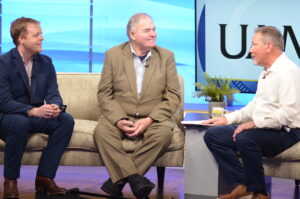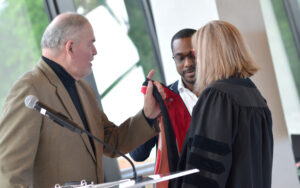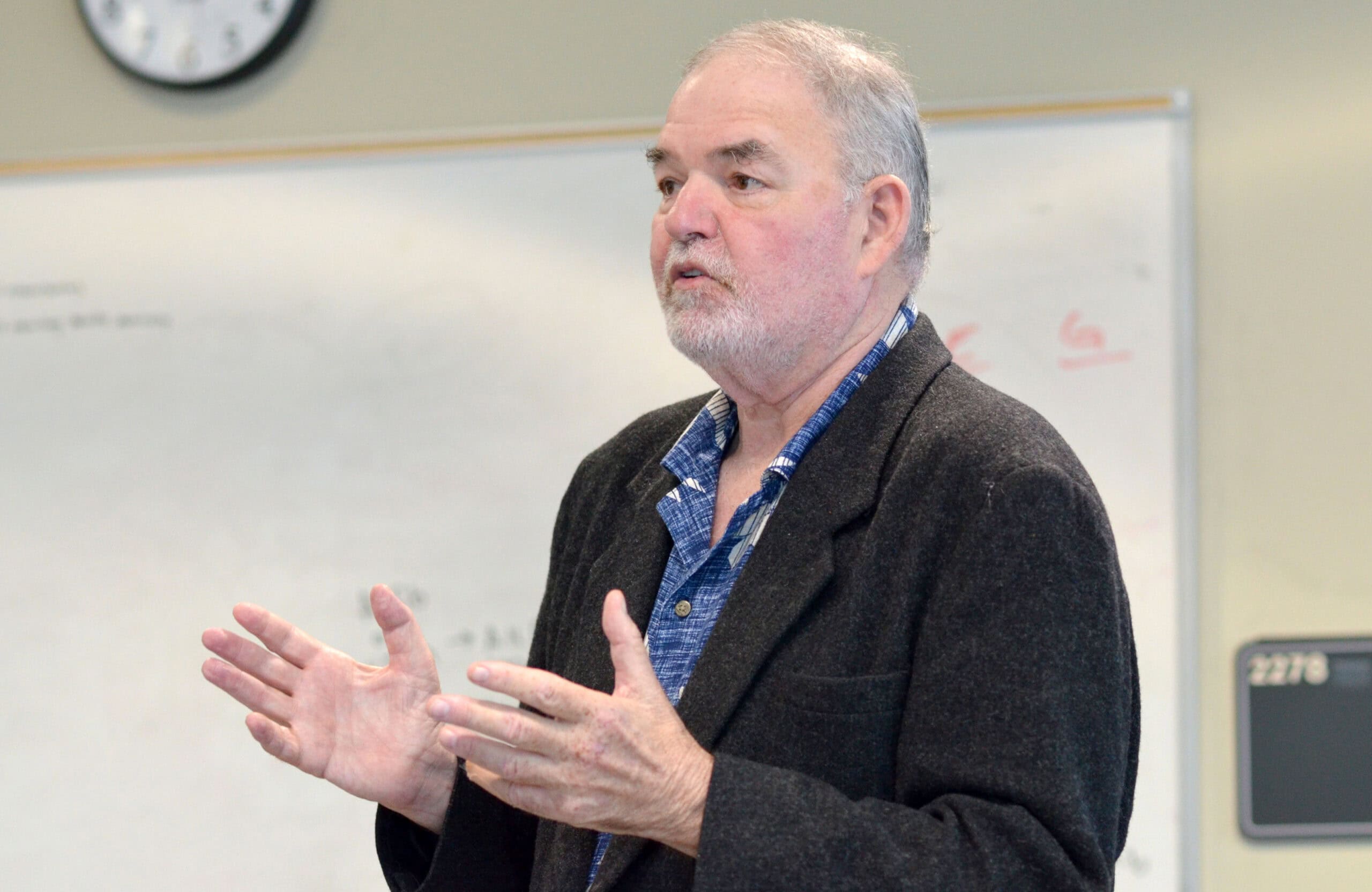Kevin Ryan, J.D., Finds His Calling Through Being an Educator, Advocate of Public Health
| With all eyes locked on him, Kevin Ryan, J.D., stands at the front of a room telling a story about a 1990s court case. But he suddenly pauses in the middle of his anecdote. Ryan then takes a few breaths, dons a big smile and says, “What each of you have to remember is that all health … is public health.”
The individuals he passionately addressed were newly admitted students attending the University of Arkansas for Medical Sciences (UAMS) Fay W. Boozman College of Public Health fall orientation.
“I pride myself on being able to talk to and feel comfortable being around anybody,” Ryan said. “I try to talk with the students, not at them. I love to have conversations with our students.”
Ryan, the college’s associate dean for student affairs, has been associated with the school since its inception. He appreciates how public health provides pathways to the kind of life every Arkansan should have access to.
“I’m actually a shy person and don’t like speaking in front of people” he said. “But due to the value of public health, I’ve forced myself to learn how to best present info. That’s important because telling stories about what’s going on in people’s lives is the best way to illustrate public health concepts.”
The peaks and valleys of Ryan’s life factor into his joy for being faculty in the college and promoting public health. He strives to help others attain a similar level of happiness.
“Public health permeates everything we do,” he said. “I work hard to help others understand its importance. I aim to convey my excitement to others, where they feel it.”
MILITARY INFLUENCE
Ryan, the oldest of four kids, comes from a military family as his dad was in the U.S. Air Force. Throughout his life, he’s interacted with people representing a variety of cultures.
“I was very fortunate to grow up in the military,” he said. “I benefited from the exposure of being around people from all over the world.”
Ryan was a preteen when his family arrived in central Arkansas, where they resided at the Little Rock Air Force Base. As a youth, Ryan never thought much about how he was in regular contact with people whose cultural beliefs were different than his. The situation helped Ryan build an empathy for people.
“You had to get comfortable around people who didn’t look or think like you,” he said. “People who didn’t look like you were your next-door neighbors, were sitting next to you in class at school.
“In fact, when I was very young and saw and heard the racism directed toward various groups that was seemingly normal in some nonmilitary communities — it shocked me that people had those beliefs.”
In addition to helping him become comfortable around all people, being in a military family forced him to become resourceful. Ryan had to be quick on his toes, due to having to look after his siblings and not having easy access to a traditional support system, especially when his father was deployed to war zones overseas.
“Growing up in a military family made me more independent,” he said. “Our family always lived thousands of miles from my mom and dad’s family. It all made me more self-sufficient. It also made me depend more on my immediate family.”
FINDING HIS WAY
Ryan would attend and eventually graduate from Jacksonville High School.
He continued his education at the then-UAMS College of Health-Related Professions. Ryan earned his first degree, a bachelor’s in radiologic technology. He’d later complete graduate work in radiation physics. While in school, he worked at UAMS and Arkansas Children’s Hospital.
Out of nowhere, he decided to make a change.
“I had some difficult life events that occurred,” he said. “I then sought a new start in life. That’s when I moved to Oklahoma to be an air traffic controller.”
However, his time in Oklahoma didn’t last long. Upon his return to central Arkansas, he enrolled in the UAMS College of Nursing. While being a full-time student, he also worked a 40-hour weekend shift at Arkansas Children’s.
Nonetheless, he completed the nursing program in two years and subsequently accepted a position in an inpatient adolescent psychiatric unit at Arkansas Children’s. Ryan would later become a radiology nurse manager at the hospital. He’d remain in that role for nearly four years. In the process, he got a master’s in health services management.
But despite being well-educated and having a nice career serving people in their time of need, Ryan was unhappy. He felt incomplete. Now in his 30s, the feelings became difficult to cope with.
“It felt like I had not done what I was supposed to in life,” Ryan said. “I didn’t have a sense that I’d fulfilled my purpose. I felt that I had more in me to contribute to the world. Personally, what I had going was not satisfactory.”
CAREER AND EDUCATION PIVOT
For most of his life Ryan has had a fascination with the court system and U.S. law. In fact, as a high school student, he considered going to law school.
It was a chance conversation with a friend, combined with that unwavering feeling of incompleteness that prompted Ryan to pivot. He remained on staff at Arkansas Children’s but returned to school again — enrolling in the University of Arkansas at Little Rock Bowen School of Law. Upon starting law school, that haunting feeling was gone.
“Studying law just felt right,” he said. “I found my purpose. I had found how I was supposed to live out the rest of my life.”
Though he enjoyed law school, the academic demands, along with working full time at Arkansas Children’s became overbearing. In his last year of law school, he left his job at the hospital and began working for the Arkansas Center for Health Improvement (ACHI).
Ultimately, Ryan completed the Bowen School of Law program in four years, graduating with high honors.
“That sense of failure that had always burdened me — like a weight. I felt it lifting off my shoulder,” Ryan said about getting the law degree.
Entering law school led to Ryan finding fulfillment in life. However, unbeknownst to him at the time, it also put Ryan in position to be part of a historic development in Arkansas.
“Working at ACHI, it changed my direction,” he said. “I was able to combine the law with my clinical background. I recognized that my path was refining toward public health, and I was having a great time.”
AMONGST THE TRAILBLAZERS
Through his duties with ACHI, Ryan was part of a group who traveled throughout Arkansas to meet with its residents.
For starters, the group wanted Arkansans to have the right to vote on whether part of a tobacco settlement would go toward funding the creation of Arkansas’ first public health college. Also, they wanted to meet with the public and explain public health and why it’s invaluable.
“There were people who saw no need for a college of public health,” Ryan said. “Also at the time — throughout the country — there were not many colleges of public health.”

Kevin Ryan, J.D., (middle) takes part in a KATV Good Morning Arkansas interview which highlighted the impact of the UAMS Fay W. Boozman College of Public Health.
A key to getting the necessary support was explaining how a public health college, and public health itself, can have a generational benefit for the state.
“We told people to look at the issues that Arkansas faced,” he said. “Look at the economic cost of those issues. The message was, supporting a public health college would reduce those costly issues through education, research and service to the community. A public health college would create trained public health workers who can serve in Arkansas’ communities. That’s what sold it.”
The group gathered enough signatures to get the measure placed on the ballot. Voters later approved using part of the tobacco settlement to establish a state public health college.
Though Ryan deems his role in the mission to be minor — it confirmed his chosen path.
“I found what I was supposed to do,” Ryan said. “I’ve never regretted my decision to enter the field of public health.”
Working for ACHI led to Ryan not only being part of a crusade that upgraded the state of health in Arkansas, but it also led to him being able to teach in the newly created college. Throughout its duration, Ryan has been an educator in the school. It’s something he truly delights in.
“I’m a researcher,” he said. “I’ve been a part of numerous community-based improvement projects. I serve as an administrator, but where I feel I contribute the most is teaching and working with the students. I love helping to guide our students as they enter into their career and throughout their lives.
“I’ve been able to be part of the process and see the vision fulfilled.”
RYAN AND THE STUDENTS
There’s a lot that Ryan appreciates about the opportunity to teach and be around people from various backgrounds.
“It makes our community stronger to have different perspectives available,” he said. “One of the things I want is for this world to be a better, more empathetic place.”
David Vrudny is a student in the college’s Doctor of Public Health program. He’s taken multiple classes taught by Ryan and has become a fan of his teaching style. Vrudny, a staff member at the Arkansas Department of Health, says his experience as a student has been enhanced through Ryan’s style of teaching.
“Professor Ryan brings his teaching to life through storytelling,” he said. “That’s important because stories help us as students remember his points. He uses key components of storytelling, characters and conflict to present a message. In my work, I also give presentations and use storytelling to make my messages more memorable and persuasive — like what I’ve seen Ryan do while he’s teaching.”
Ryan also encourages dialogue within his classes. He especially loves dialogues keyed by real life stories in public health.
“When I teach, I want my students to hear and take in the info that’s presented, make it a part of their life,” he said. “Telling stories about the material makes it easier for a student to relate to. We as people connect to stories. That’s how I teach and promote public health.”

Kevin Ryan, (left) J.D., participates in a hooding ceremony alongside Austin Porter, (right) Dr.PH., during the 2024 UAMS Fay W. Boozman College of Public Health Convocation.
He also uses entertainment and entertainers to spark class discussions as well.
“With every course I show a lot of TV and movie clips, I use current events and public health in the news to demonstrate how applicable the concepts we discuss truly are,” Ryan said. “I encourage my students to have dialogue with each other about public health issues. What that leads to is having a group of students talking with one another and presenting solutions to those issues.”
“The students are in a prime position to help change society”, he added.
“The lack of being able to work together is a public health issue,” Ryan said. “Divisiveness is a public health issue. We must be able to listen to each other and see the value of other perspectives.”
EXCITED ABOUT PEOPLE
Ryan wants Arkansans to have easy access to good health and happiness.
Some of it goes back to his days as a youth watching over his siblings, making sure they’re safe. Some of it relates to him being a devoted father and grandfather.
“I strive to be an important presence in my grandkids’ lives,” he said. “They’re an important part of my life. I want to do my part to leave the world in better shape for my grandkids, than it is for me or my adult daughter.”
His compassion for the well-being of people also dates back to a time when he dealt with constant sadness and dissatisfaction. He embraces any opportunity to promote not only the college, but public health as well.
“One of the ways to make the world better for future generations is to improve the overall health of the general public,” he said.
When speaking on the value of public health in Arkansans, Ryan admittedly becomes exuberant.
“When teaching or doing a speaking engagement, it may come across that I’m gregarious, outgoing, loquacious, but I’m not,” he said. “Years ago, I learned that it was important to present information in a way that others could connect to.”
Ryan’s enthusiasm and heavy use of storytelling and dialogue is all about humanizing the concepts of public health, he added.
“It is frustrating to know that there are still a lot of people who don’t know what public health is and how important it is in their life,” he said. “At the end of the day, all health is public health. Everything that takes place
